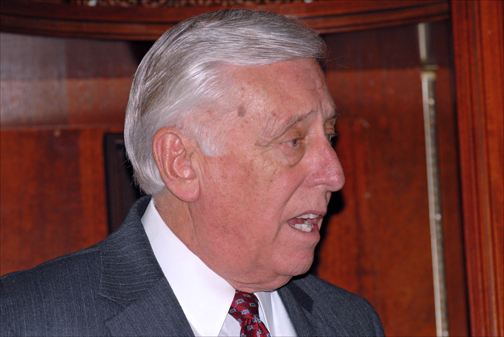Congress must protect P.R’s ‘fragile’ health-care system


House Minority Whip Steny Hoyer (D-Md), offers support for solutions to Puerto Rico’s health-care crisis. (Credit: Larry Luxner)
WASHINGTON — The prognosis for Puerto Rico’s health system is already critical and will only get worse if Congress doesn’t act fast, warned a panel of doctors and finance experts meeting on Capitol Hill this week.
The briefing, organized by the Puerto Rico Health Care Crisis Coalition (PRHCC) and the Congressional Hispanic Caucus, also featured comments by three sympathetic Democrats: House Minority Whip Steny Hoyer of Maryland, Rep. José Serrano of New York, and Puerto Rico’s non-voting Resident Commissioner, Pedro Pierluisi.
“Congress has held seven hearings on the island’s fiscal crisis in the last 12 months, including one this morning in the House Natural Resources Committee,” which will soon draft a legislative package on Puerto Rico, said Pierluisi.
“The forthcoming bill, if it has a positive long-term impact, should provide Puerto Rico with more equitable, state-like treatment under federal programs. Right now, we have a system in which my constituents are treated unfairly if they remain in Puerto Rico,” he said. “They can obtain fair treatment by moving to the states, which they’re doing in unprecedented numbers. This system is not only immoral, it is also illogical.”
Puerto Rico’s fiscal crisis has prompted not only patients to flee the island, but doctors as well. Without Congressional action, “billions will continue to be cut from the island’s health-care system and would escalate an already fragile situation into a profound humanitarian crisis,” warned PRHCC President Dennis Rivera.
José Laborde, an economics professor at the University of Puerto Rico, noted that of the island’s 3.5 million inhabitants, 15.7 percent have diabetes and 45.5 percent hypertension. Even worse, median income is only $20,600 (compared to around $57,000 on the U.S. mainland) and 61.9 percent of the population relies on Medicaid and Medicare. That compares to 53.1 percent in Texas, 55.0 percent in New York, 47.9 percent in Florida and 33.8 percent in California.
“Because we depend on these programs, our public health sector is very large. The government represents more than 75 percent of health expenditures,” he said, adding that health care employs 85,400 people on the island. “We’re at a point where we can’t take any more hits. Anything else that happens to the health-care sector would be catastrophic.”

Ricardo A. Rivera Cardona, executive director of the Puerto Rico Health Insurance Administration. (Credit: Larry Luxner)
Ricardo Rivera-Cardona is executive director of the Puerto Rico Health Insurance Administration (ASES, as the agency is known in Spanish), which serves 46 percent of the island’s residents. He said general practitioners on the island earn an average $64,800 a year, compared to $187,199 in Mississippi, the poorest state. And dentists earn an average $47,510 in Puerto Rico, versus $135,280 in Mississippi.
“More than 10,000 health professionals — or 12 percent of the industry’s workforce — have migrated to the U.S. mainland during the past four years,” he said, adding that reduced payments prevent hospitals from buying the latest equipment or maintaining their facilities properly.
“This lack of resources explains why the waiting time to get an appointment with a specialist is twice the amount in Puerto Rico compared to the U.S.,” he added.
The ASES chief urged his audience to pressure Congress to remove the $400 million cap on Medicaid the island currently faces, and eliminate the health insurance tax (HIT) which he says costs Puerto Rico an additional $70 million a year.
“This Medicaid cap limits our matching dollars to an effective rate of 14 percent. Puerto Rico’s share is 86 percent. Currently we are covering this gap with a $6.4 billion grant from the Affordable Care Act. But this was the result of a political lobbying process,” said Rivera.
He added: “We will run out of federal funds by late 2017 or early 2018 if nothing extraordinary happens. One million people could suddenly be uninsured, 80,000 jobs will be lost and the island’s economy will contract by an additional $1.4 billion. All Puerto Ricans will be impacted — not just those covered by Medicaid and Medicare.”
Hoyer, who has used his leadership position in Congress before to urge action on the issue, added his voice to those who say lawmakers “have a responsibility to ensure that Puerto Rico’s debt crisis doesn’t turn into an economic catastrophe” for its residents.
“We need to raise the anxiety level among those who do not live in Puerto Rico. This is a bipartisan concern,” he said. “We’re not treating Puerto Rico the way we should. This is an issue of equity and fairness. We need to act this year. Next year is too late.”











